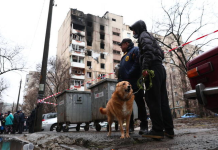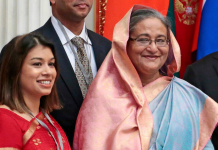NEW DELHI, AUG 20 (AFP/APP/DNA): India’s Supreme Court on Tuesday ordered a national task force to examine how to bolster security for healthcare workers after the “horrific” rape and murder of a doctor sparked medical strikes and furious protests.
The discovery of the 31-year-old doctor’s bloodied body at a state-run hospital in the eastern city of Kolkata on August 9 has stoked nationwide anger at the chronic issue of violence against women.
Doctors’ associations from government-run hospitals in many cities across India have launched strikes that cut non-essential services, with protests in their second week.
Demonstrators have given the murdered doctor the nickname “Abhaya”, meaning “fearless”.
Protesters marched through Kolkata on Tuesday, holding up signs demanding “justice”, while the country’s top court issued orders in the capital New Delhi.
“The brutality of the sexual assault and the nature of the crime have shocked the conscience of the nation,” the three-judge bench said in its order, calling the details “horrific”.
Chief Justice D. Y. Chandrachud read out the order, which called for the formation of a “national task force” of top doctors to prepare a plan to prevent violence in healthcare facilities and draw up an “enforceable national protocol” for safe working conditions.
The court said it had been forced to step in as the issue was of national concern.
“With the involvement of systemic issues for healthcare across the nation, this court has had to intervene”, it added.
– ‘Cannot await a rape’ –
“The lack of institutional safety norms at medical establishments, against both violence and sexual violence against medical professionals, is a matter of serious concern”, the court order read.
“With few or no protective systems to ensure their safety, medical professionals have become vulnerable to violence”, it added, highlighting a lack of CCTV cameras and a failure to screen visitors to hospitals for weapons.
“Lack of security personnel in medical care units is more of a norm than an exception”, it said.
The murdered doctor was found in the teaching hospital’s seminar hall, suggesting she had gone there for a break during a 36-hour-long shift.
An autopsy confirmed she had been sexually assaulted and, in a petition to the Kolkata High Court, her parents said they suspected their daughter was gang raped.
Many of the protests have been led by doctors and other healthcare workers but have also been joined by tens of thousands of ordinary Indians demanding action.
“As more and more women join the workforce in cutting edge areas of knowledge and science, the nation has a vital stake in ensuring safe and dignified conditions of work,” the court said.
“The nation cannot await a rape or murder for real changes on the ground”, it added.
Doctors have also demanded the implementation of the Central Protection Act, a bill to protect healthcare workers from violence.
One man, who worked at the hospital helping people navigate busy queues, has been detained.
– ‘Violence’ –
The gruesome nature of the attack has invoked comparisons with the horrific 2012 gang rape and murder of a young woman on a Delhi bus.
It has sparked widespread outrage in a country where sexual violence against women is endemic.
An average of nearly 90 rapes a day were reported in 2022 in the country of 1.4 billion people.
And conditions in some hospitals are grim.
The court highlighted gruelling 36-hour shifts where “even basic needs of sanitation, nutrition, hygiene and rest are lacking”.
It is also common in India for relatives to accuse healthcare workers of negligence when a patient dies, with the court noting such allegations are often “immediately followed by violence”.
Among the examples it listed, the court recounted how a nurse in Bihar state was pushed off the first floor of a hospital in May by the family of a pregnant patient who had died.

















